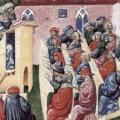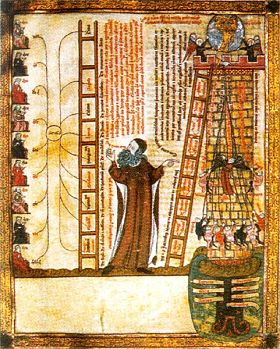298. Renaissance Men: Ramon Llull and Petrarch
Posted on
The Renaissance ideals of humanism and universal science flourish already in the medieval period, in the works of Petrarch and Ramon Llull.
Themes:
Further Reading
• A. Bonner (trans.), Doctor Illuminatus: a Ramon Llull Reader (Princeton: 1993).
• A. Bonner (trans.), Selected Works of Ramon Llull, 2 vols (Princeton: 1985).
• N. Mann, Francesco Petrarca: My Secret Book (Cambridge, MA: 2016).
• A.R. Ascoli and U. Falkeid (eds), The Cambridge Companion to Petrarch (Cambridge: 2015).
• A.M. Austin, M.D. Johnston (eds), A Companion to Ramon Llull and Lullism (Leiden: 2019).
• A. Bonner, The Art and Logic of Ramon Llull: A User’s Guide (Leiden: 2007).
• A. Fidora and J.E. Rubio (eds), Raimundus Lullus: An Introduction to His Life, Works and Thought (Turnhout: 2008).
• M.D. Johnston, The Spiritual Logic of Ramon Llull (Oxford: 1987).
• V. Kirkham and A. Maggi (eds), Petrarch: a Critical Guide to the Complete Works (Chicago: 2009).
• N. Mann, Petrarch (Oxford: 1984).
• A. Mazzocco, “Petrarch: Founder of Renassance Humanism?” in A. Mazzocco (ed.), Interpretations of Renaissance Humanism (Leiden: 2006), 215-42.
• A. Lee, Petrarch and St Augustine: Classical Scholarship, Christian Theology and the Origins of the Renaissance in Italy (Leiden: 2012).
• J.E. Siegel, Rhetoric and Philosophy in Renaissance Humanism (Princeton: 1968).
• C. Trinkaus, The Poet as Philosopher: Petrarch and the Formation of Renaissance Consciousness (New Haven: 1979).
• G. Zak, Petrarch’s Humanism and the Care of the Self (Cambridge: 2010).







Comments
All caught up...
I started listening to the series in June 2017 and, as of today 4/4/2018, have listened to every podcast up to and including #298 on Llull and Petrarch. And it's all been quite fascinating. I have been surprised to learn, though, that apparently agnostics and atheists are as rare in the history of philosophy without any gaps (at least up to the 14th century) as they are foxholes. Thank you for putting in the enormous time and energy that such an undertaking must require.
In reply to All caught up... by Gene Mroz
Caught up
Thanks, glad you stuck with the series and have enjoyed it! You're right: not much pre-modern atheism. In addition to the social pressures that would have prevented it, bear in mind that an atheist text would be unlikely to be transmitted (preserving books was a lot of work back then). But you might be interested in a book that presents a case for more ancient atheists than I did: "Battling the Gods: Atheism in the Ancient World" by Tim Whitmarsh. I think he may make too much out of texts where person A is calling person B an atheist in order to abuse them but it is still worth checking out.
Petrarch
Hi Peter,
will we get more on Petrach in your forthcoming branch on Renaissance Philosophy?
Greetings, M.G.
In reply to Petrarch by Michael Gebauer
More Petrarch
There won't be a whole new episode on him, as there will be with Christine de Pizan, but I am sure I'll be referring back to him as a precedent when I cover the Humanists.
Mnemonic Arts of Blessed Raymond LULL
http://lullianarts.narpan.net has some somewhat hard to install software to show the "art"
Add new comment